

E T H N O P O E T I C S. Henry Munn I am the woman of the great expanse of the water I am the woman of the expanse of the divine sea the woman of the flowing water a woman who examines and searches a woman with hands and measure a woman mistress of measure I am a woman of letters, it says I am a book woman, it says nobody can close my book, it says nobody can take my book away from me, it says my book encountered beneath the water, it says my book of prayers I am a woman wise in words beneath the water, it says I am a woman wise in words beneath the sea, it says "You my Mother who are in the House of Heaven," sings María Sabina in 1956, "You my Father who are in the House of Heaven/ There do I go/ And there do I go arriving/ There do I go showing my book/ There do I go showing my tongue and my mouth/ There do I go signalling the tracks of the palms of my hands.
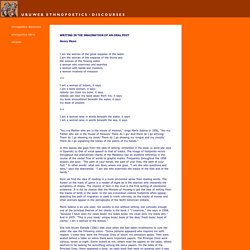
" Writing/Writers. Bob Marley. Robert Nesta "Bob" Marley, OM (6 February 1945 – 11 May 1981) was a Jamaican reggae singer, song writer, musician, and guitarist who achieved international fame and acclaim.[1][2] Starting out in 1963 with the group The Wailers, he forged a distinctive songwriting and vocal style that would later resonate with audiences worldwide.
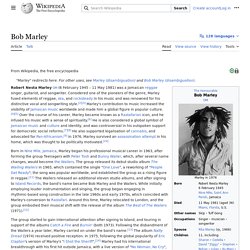
The Wailers would go on to release some of the earliest reggae records with producer Lee Scratch Perry.[3] After the Wailers disbanded in 1974,[4] Marley pursued a solo career that culminated in the release of the album Exodus in 1977, which established his worldwide reputation and produced his status as one of the world's best-selling artists of all time, with sales of more than 75 million records.[5][6] He was a committed Rastafari who infused his music with a sense of spirituality.[7] Early life and career Marley and Neville Livingston (later known as Bunny Wailer) had been childhood friends in Nine Mile.
Bob Marley and the Wailers 1962–1972: Early years Notes. Mahatma Gandhi. Mohandas Karamchand Gandhi (pronounced [ˈmoːɦənd̪aːs ˈkərəmtʃənd̪ ˈɡaːnd̪ʱi] ( ); 2 October 1869 – 30 January 1948) was the preeminent leader of Indian nationalism in British-ruled India.
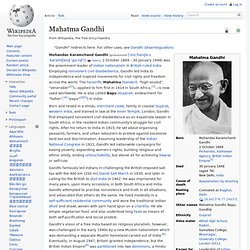
Employing nonviolent civil disobedience, Gandhi led India to independence and inspired movements for civil rights and freedom across the world. The honorific Mahatma (Sanskrit: "high-souled", "venerable"[2])—applied to him first in 1914 in South Africa,[3]—is now used worldwide. He is also called Bapu (Gujarati: endearment for "father",[4] "papa"[4][5]) in India. Gandhi famously led Indians in challenging the British-imposed salt tax with the 400 km (250 mi) Dandi Salt March in 1930, and later in calling for the British to Quit India in 1942.
Gandhi is commonly, though not officially,[10] considered the Father of the Nation[11] in India. Abraham Maslow. Abraham Harold Maslow (/ˈmæzloʊ/[citation needed]; April 1, 1908 – June 8, 1970) was an American psychologist who was best known for creating Maslow's hierarchy of needs, a theory of psychological health predicated on fulfilling innate human needs in priority, culminating in self-actualization.[2] Maslow was a psychology professor at Brandeis University, Brooklyn College, New School for Social Research and Columbia University.
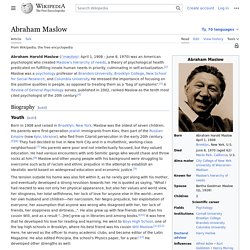
He stressed the importance of focusing on the positive qualities in people, as opposed to treating them as a "bag of symptoms. "[3] A Review of General Psychology survey, published in 2002, ranked Maslow as the tenth most cited psychologist of the 20th century.[4] Biography[edit] Youth[edit] Terence McKenna. Neil Gaiman. Henry David Thoreau. Thoreau's books, articles, essays, journals, and poetry amount to more than 20 volumes.
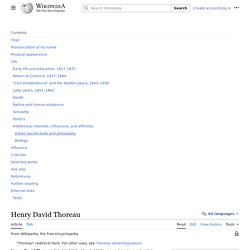
Among his lasting contributions are his writings on natural history and philosophy, in which he anticipated the methods and findings of ecology and environmental history, two sources of modern-day environmentalism. On Edgar Allan Poe by Marilynne Robinson. Edgar Allan Poe was and is a turbulence, an anomaly among the major American writers of his period, an anomaly to this day.
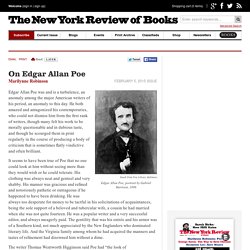
He both amazed and antagonized his contemporaries, who could not dismiss him from the first rank of writers, though many felt his work to be morally questionable and in dubious taste, and though he scourged them in print regularly in the course of producing a body of criticism that is sometimes flatly vindictive and often brilliant. It seems to have been true of Poe that no one could look at him without seeing more than they would wish or he could tolerate. Percy Bysshe Shelley. Percy Bysshe Shelley (/ˈpɜrsi ˈbɪʃ ˈʃɛli/;[2] 4 August 1792 – 8 July 1822) was one of the major English Romantic poets, and is regarded by some critics as amongst the finest lyric poets in the English language.
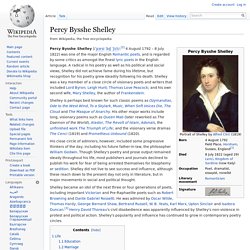
A radical in his poetry as well as his political and social views, Shelley did not achieve fame during his lifetime, but recognition for his poetry grew steadily following his death.